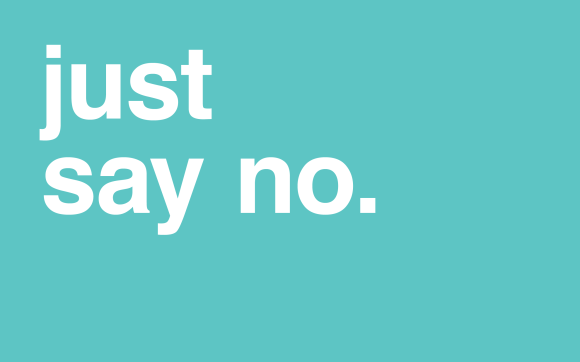Most people at startups are in the habit of saying yes.
This new year if you are looking for a resolution that will transform your startup, get in the habit of saying no.
The Habit of Yes
The habit of yes occurs when a founder asks you to help him with something that “will only take half an hour,” or when a co-worker asks you sneak in a “quick” bug fix to the weekly sprint because it’s an “easy fix and should only take ten minutes.” We’ve all been there and our natural inclination is to say yes.
There are lots of reasons why we say yes but most of them have to do with the fact that saying no feels rude. Yes, on the other hand, leads to happy co-workers, happy founders and a conflict-free environment. Yes, for lack of a better word, is nice. It is pleasant. It is agreeable. And everyone likes yes.
The Danger of Yes
But yes is a dangerous habit to fall into. Saying yes here and there might seem harmless. But all those little yeses add up. They compound on each other, and they can transform a decisive strategy with clear objectives into an all-you-can-eat buffet of tactics and activities with no common goal.
The true cost of yes is far greater than most of us realize. When we say yes to the small things, we’re also saying yes to switching costs. We’re saying yes to scope creep. We’re saying yes to shipping late.
Falling into the habit of yes is like running a marathon where every three miles you decide to run in a different direction for a quarter mile before getting back on course.
The habit of yes means never crossing the finish line before your competitors, or worse yet, never crossing at all.
Everyone wants to be respectful of their co-workers but invariably saying yes to every request is actually disrespectful to the company. Yes leads to mediocrity. Yes is execution’s achilles heel. Yes is a non-confrontational cop-out. It circumvents the reality that we need to make hard choices.
Ultimately, yes isn’t respectful. Yes is the insidious startup killer.
The Habit of No
The habit of no is one of the healthiest habits your startup can develop.
At its most basic level, the habit of no is about accepting the reality that all ideas are not equal. The habit of no means ruthlessly prioritizing ideas, setting goals and then sticking to them. No is having the conviction to eliminate the good in order to get to the great.
The Path To Greatness is Paved with No
The reason that no is so important is simple: no company has ever achieved greatness by beinggood at ten different things. They achieve greatness by being best-in-the-world at one thing.
The best companies have a singular thesis about what the future looks like and then maniacally execute against that thesis. They ignore the outside noise. They know exactly where they are going and then say no to any ideas that don’t take them closer to achieving their goal.
Take Google for example. Today Google offers everything from cloud storage to grocery delivery but that is not how Google won the Internet. Google won the Internet because long before you could use Google to video chat with Nana halfway across the country, Google figured out how do one thing 10X better than anyone else in the world: sell ads on the search engine results page.
The same idea can be applied to investing in public stock markets. No one has ever become a billionaire by betting on index funds. Investors win big when they have a thesis about what the future looks like and then place all their chips on the sector or company they think has the greatest chance of creating that future. The greater the risk, the greater the reward. The startup world is exactly the same.
Moonshot or Bust
To fully understand why the habit of no is so critical for startups, it’s necessary to understand the binary dynamic of how venture-backed startups operate.
If you are at a venture-backed startup, by definition your singular objective is growth. You’re not aiming for single or double digit growth. You’re shooting for 1000% YoY growth.
Your objective is to land a moonshot or die trying.
Startups that fall into the habit of yes never hit the moon. Instead, they divide their time between a handful of activities and end up doing all of them at a B+ level. In the real world getting a B+ is an okay outcome, but in the binary world of startups a B+ is the same as an F. B+ work might get you 85% towards the moon, but it will never, ever, ever get you all the way there.
Once you realize that B+, A- or even A work isn’t good enough to hit the moon, it necessarily changes the way you have to operate.
Developing a Habit of No at Your Startup
When a startup has a culture of yes, the people who have the courage to say no may get labeled as unhelpful, selfish or “not a team player.” But this couldn’t be further from the truth.
The habit of no is actually all about teamwork. It’s about acknowledging what is required for everyone to reach a common goal, respecting this common goal and giving your company and your co-workers the best shot of achieving it.
If your startup’s goal is to land on the moon, the next time someone asks you to do something that pulls you off course from achieving this goal, you should politely decline.
If you’re afraid you might ruffle some feathers, share this blog post with them in your response.
Or even better yet, have an open discussion with them. Show them your prioritized list of tasks you are working on in order to achieve the overarching company goals. Once all the information is on the table, decide together if the new task is more or less likely to move you closer to your company goals.
The habit of no can be scary but it can also be transformative. It starts with one person and then it spreads. It’s certainly not the easiest habit to develop, but if you can commit to keeping your head down — to executing on a common goal, and inspiring others around you to do the same, you might all look up one day and realize: “Holy shit! We’re on the moon.”







